Source: CCTV.com
01-21-2007 16:47
Singapore has been tightening its borders to keep out illegal immigrants. The country's prospering economy and higher wages are drawing people from Malaysia and Thailand.
In today's Labor Series, Siti Rohanan Koid from Singapore's Media Corp News takes a look at how these people are affecting Singapore.
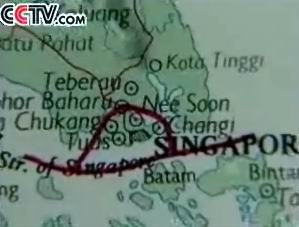 |
As Singapore cracks down on the number of people entering its borders illegally, China is having trouble getting its overseas workers to come back. In tomorrow's Labor Series, we take a look at why some Chinese working overseas are not returning home.
Singapore, to many, is a land of opportunity. With a vibrant economy, this land of four million people, is also seen as safe and clean, attracting talent and investments from across the world.
Against this backdrop, Asia too is prospering. But for many, the wait is just too long.
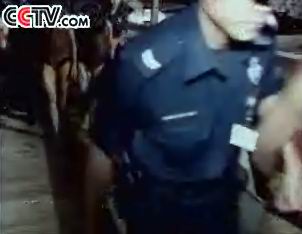 |
These scenes off Singapore waters are not uncommon. Although post-911, Singapore has tightened its borders, many have tried to smuggle in.
Some by swimming across the straits of Singapore and Malaysia, which at its narrowest point, is only 400 metres apart.
Among those caught was Aung, a 34-year-old Myanmar national, who smuggled in from Johor Bahru, Malaysia. He first entered Thailand illegally, then Malaysia, but he soon heard stories about higher wages in Singapore.
Aung said “My friends told me to go to Singapore. The wages are high there. Atai (the agent) told me there’s a lot of work there (Singapore).”
Aung said he paid ‘Atai’ $1200 Singapore dollars. 'Atai’ reappeared only 5 days later. He then drove Aung, along with 5 other illegal immigrants, after midnight, to a secluded spot on a beach. The men were then given floats to help them swim towards Singapore.
Disillusioned, but left with no choice, Aung swam across the waters towards Singapore.
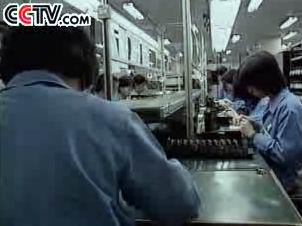 |
Like others before him, Aung soon took up odd jobs illegally, drawing daily wages, in low-skilled industries such as cleaning, manufacturing, shipping and construction.
But within 6 months, Aung was uncovered. This was during a raid at a place he rented, conducted by officers from Singapore’s Immigration and Customs Authority or the ICA. As he had no passport or a valid work permit, he was arrested.
Singapore is strict with the laws.
After Aung pleaded guilty in court for illegally entering Singapore, he was sentenced to 1 months’ jail and four strokes of the cane. He has since been repatriated.
Being a small nation, Singapore can ill-afford immigrants smuggling in. Protecting its social compact is one reason, keeping crime rates low is another, but lately, with terrorists on the prowl, nothing is being left to chance.
As a result, less and less immigration offenders are entering Singapore.
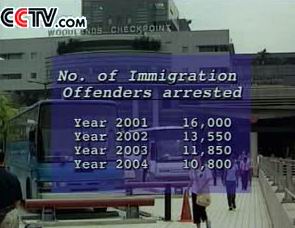 |
Despite the drop in numbers of immigration offenders, the figures are still unacceptably high.
Therefore, the authorities have invested in high-technology and sophisticated equipment. Such as MOBIX, this $6-million Singapore dollars x-ray scanner, which scans and detects those hiding under the floorboard and spare-wheel compartments of vehicles.
Some may think that such security measures are a little extreme, but in today’s climate where terrorism lurks, intrusions into Singapore’s borders could have more sinister intentions. So, Singapore works together with other Asian nations, and enforce 100% checks at all immigration points.
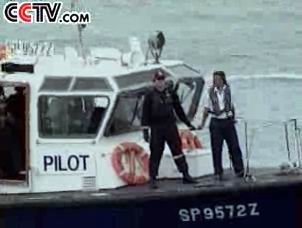 |
Lieutenant-colonel Nicholas Teo, coastal command of Singapore Navy, said “We also have mutual support in each other at sea to cover any contingency or maritime incident. In this aspect the ops centres are sort of linked and all the information that we have are all shared among ourselves.”
Indeed, shoring up Singapore’s borders is today not just a question of keeping out illegal immigrants – but an issue of national security.
Siti Rohanah Koid, reporting from Singapore.
Editor:Du Xiaodan
